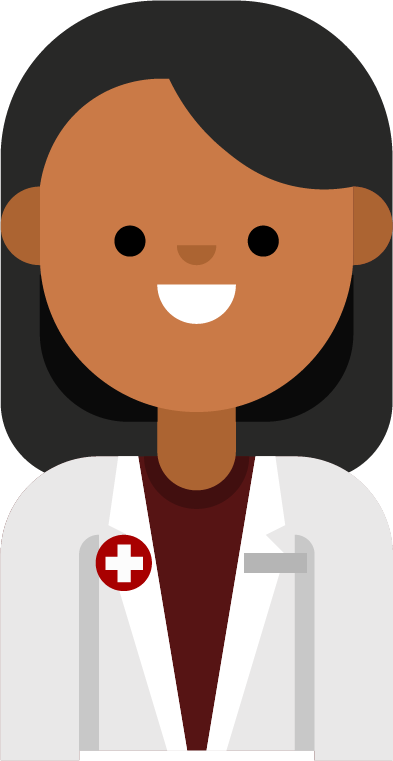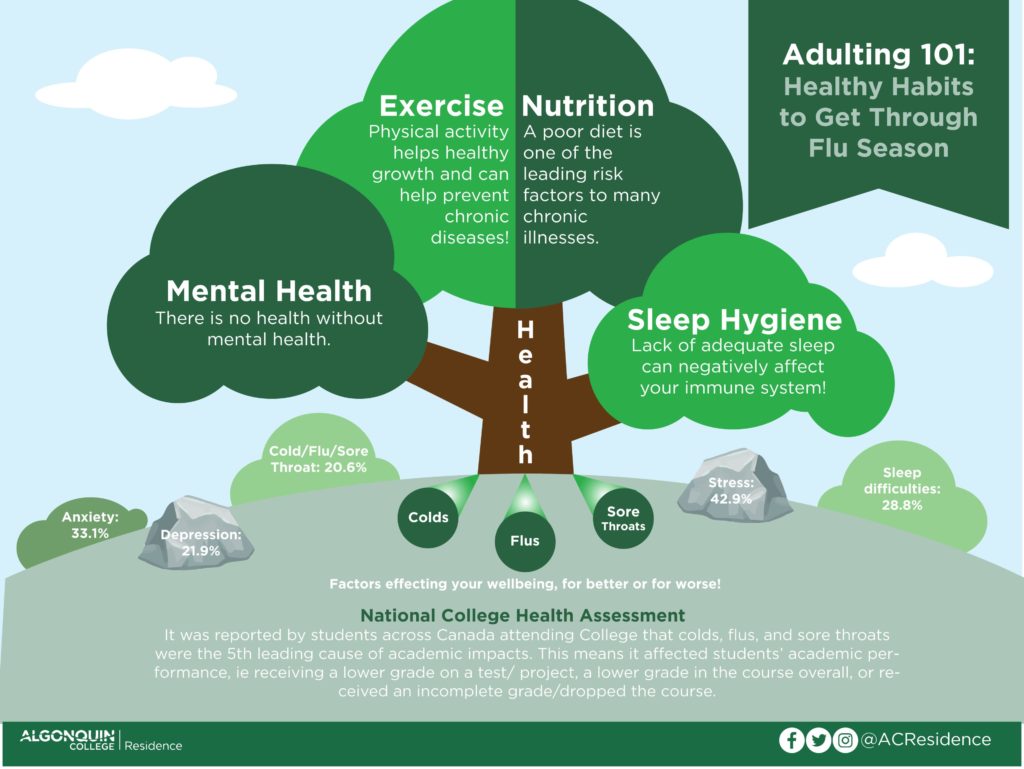Healthy Habits for Flu Season
 Did you know that colds, flu, and sore throats were the 5th leading cause of academic impacts, reported by College students across Canada?
Did you know that colds, flu, and sore throats were the 5th leading cause of academic impacts, reported by College students across Canada?
This means that colds, flu, and sore throats affected the academic performance of College students. For example, students may have received a lower grade on a test or project or in the course overall, or they may have received an incomplete grade or dropped the course.
To help you fight these impacts, we’ve put together some of our top tips for staying healthy in Residence. Check it out!
Top Tips for Staying Healthy
Take Care of Your Mental Health
The Canadian Mental Health Association states that mental and physical health are fundamentally linked. Health is no longer understood as an absence of disease; health is a state of complete physical, mental and social well-being. In fact, there is no health without mental health.
Facts:
- Poor mental health is a risk factor for acquiring long-lasting physical illnesses.
- People with long-lasting physical illnesses are at risk of developing poor mental health.
Tip for Improving Your Mental Health:
- Maintain healthy relationships with those you love. This includes friends, family, and partners. Toxic people won’t help your mental health.
- Check-in with yourself from time to time. Spend a few minutes each night reflecting on what went well and what didn’t go so well today. Is there anything that you can improve on? Did you do the best you could do today?
- Prioritize time for sleep and healthy meals. You’ll have more energy!
- Incorporate self-care into your life, whether that’s taking a long shower, applying your favourite moisturizer, getting some fresh air, or doing some yoga or meditation. Whatever method of self-care you choose, it’s important to take some time to take care of YOU.
Get Some Good Sleep
Can a lack of sleep make you ill?
Yes! Studies show that when you don’t get adequate rest you are more at risk of being exposed to a virus, such as a common cold. The lack of sleep you have will also affect your recovery sleep – when you are sick you need more sleep, so lack of sleep prior to this means you will need to sleep ever longer.
Sleep and Cytokines
Cytokines are produced when you sleep and are required to increase when you are fighting an infection. However, sleep deprivation can decrease the production of cytokines in your body.
What to Avoid If You Want to Sleep Well
- Large fatty foods before bedtime – these can make it harder to fall asleep
- Caffeine and energy drinks late in the day – caffeine can take several hours for the effects to wear off
- Too many fluids before bedtime – this can wake you up repeatedly to use the bathroom
- An unhealthy lifestyle – eating a healthy diet, maintaining a healthy weight and getting enough exercise as part of a healthy lifestyle can help you sleep better!
- Exercising late at night can also cause some people to have trouble falling asleep
Seek Medical Advice
If you struggling with your sleep, eating well, or any other aspect of your health, including your mental health, it is important to speak to a medical professional for advice.
If you are not sure what service you should speak to, you can connect with your RA or your Residence Life Coordinator (RLC) who will be able to refer you to the correct service. Your RA is based on your floor of the Residence, and the RLCs are based in the Residence Life Department in the Back Lobby of Residence.
For more information about all of the services available to you, please click here.
The National College Health Assessment
This page was inspired by the results of the National College Health Assessment (NCHA). The NCHA is a nation-wide survey that involves College students reporting on topics such as STIs, how safe they feel on campus, alcohol and drug use, and mental health, amongst many other topics. Here are the 5 five leading causes of academic impacts, as identified by College students in the assessment.

Please click here for more information about the NCHA results.
- Stress: 42.9%
- Anxiety: 33.1%
- Sleep difficulties: 28.8%
- Depression: 21.9%
- Cold/Flu/Sore throat: 20.6%
Be sure to check out the rest of the information in our Healthy Living Guide for top tips on how to stay healthy in Residence.
